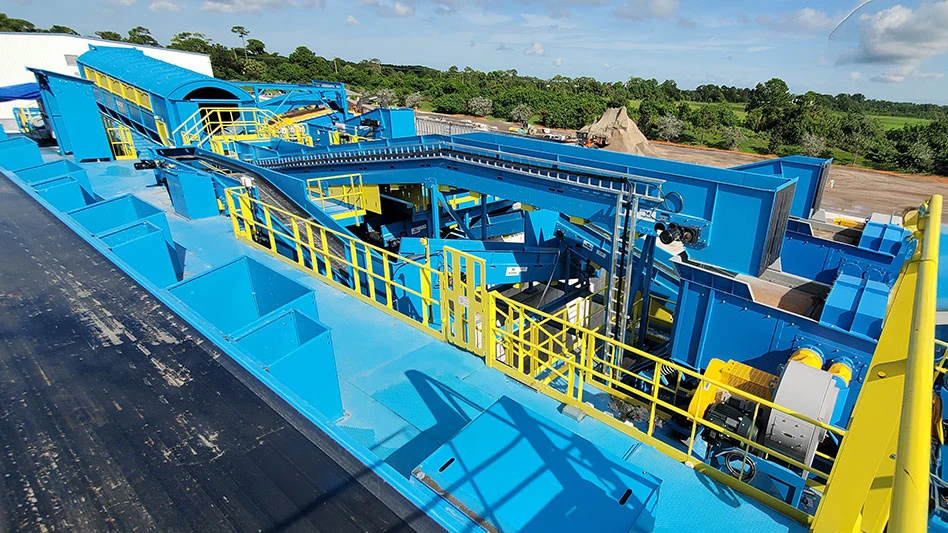
In late 2020, the U.S. Department of Energy (DOE) announced the winners of Phase II of its Lithium-Ion Battery Recycling Prize. Among the seven winners was Seattle-based Team Portables, a collaboration led by Everledger, an independent technology company that uses blockchain, artificial intelligence, intelligent labeling and internet of things to help companies uncover and unify asset information. The London-based company says its technology brings increased transparency to supply chains, benefiting stakeholders who adopt sustainable practices while bringing visibility to their end consumers.
The other companies participating in Team Portables are Palo Alto, California-based electronics manufacturer HP, the Atlanta-based battery stewardship organization Call2Recycle and Amsterdam-based cellphone manufacturer Fairphone will use the $357,000 cash prize to develop a prototype app called Reward to Recycle, where consumers can learn how to earn a reward from contributing partners for recycling their portable lithium-based batteries (LIBs), as well as keep a register of their rewards. LIBs are commonly found in smartphones, laptops, tablets or cordless power tools.

The group’s solution, “Closing the loop on portable lithium-ion batteries,” aims to help the DOE achieve its goal of capturing 90 percent of all discarded or spent LIBs in the United States for eventual recovery of key materials for a sustainable reintroduction into the supply chain by focusing on portable personal electronic devices, such as cellphones, laptops and tablets, and incentivizing consumers to properly recycle them.
With the help of its cash prize, Team Portables is developing and testing its app, which establishes a Battery Passport to track portable LIBs and support final recycling. The Battery Passport can be accessed by IOT identifiers as part of the labeling for each LIB. Using their smartphones, registered users will be able to find out more about recycling and actively earn rewards for doing so.
Lauren Roman, Everledger’s business development director for Metals & Minerals Ecosystems, says that while Team Portables partner Call2Recycle has an app that tells consumers where and how to safely recycle their LIBs, consumer awareness remains low. Everledger’s solution involves adding a QR code to the devices and batteries that directs consumers to the Call2Recycle database of recycling locations, she says. Scanning the code also registers the battery. Once the consumer arrives at the collection site, he or she scans the QR code at the site, validating that they have recycled the battery. At that point, the consumer is given a reward in the form of a coupon or points that can be applied toward a future coupon, Roman says.
She adds that the DOE’s goal is to go from what it says is the current 5 percent recycling rate for LIBs to a 90 percent recycling rate. “That’s quite a stretch,” Roman says, particular because many products containing LIBs are not marked. “Just giving a consumer an app is not enough, you need to incentivize them.”
That incentive will come from tech manufacturers, such as Team Portables member HP. Roman says the manufacturer had a similar project with Best Buy that was paused because of the COVID-19 pandemic. For every device that consumers brought into Best Buy for recycling, they would get a coupon that could be applied toward a new HP product.
The full end-to-end solution will involve the program sponsorship by the DOE, with participation from HP, Fairphone and other manufacturers of LIB-powered products, Call2Recycle and other collectors and sorters in the recycling chain and the incentivization of end consumers.
Through the app, consumers will be motivated to get their batteries to a qualified collection center. They also can learn more about sustainability, find their closest recycling centers and even track their batteries from collection to recycling, as well as view their own sustainability footprint, according to a news release about the project issued by Everledger.
Roman says, “The basis of the solution is blockchain.”
Blockchain, as defined by IBM, “is a shared, immutable ledger that facilitates the process of recording transactions and tracking assets in a business network.”
The solution seeks to optimize the circularity of LIB raw materials, prevent disposal of hazardous materials and reward consumers and support the industry to foster corporate social responsibility (CSR) and sustainability initiatives.
Patrick Gibbs, Environmental Programs manager (NA) for HP, says, “HP Inc. is committed to practices that enable positive outcomes for the planet, people and communities where we do business. This approach allows us to take the concept into the community and really start the behavior change that’s needed to stop the unsustainable disposal of lithium-ion batteries.”
“Aside from the environmental and cost benefits of recycling, safe collection of LIBs will reduce the growing occurrence of fires and environmental damage caused by disposal through household and business garbage,” says Eva Gouwens, CEO of Fairphone, a smartphone manufacturer that is piloting batteries with a QR code smart label in this project. “Our goal is to help people understand how their purchasing preferences and behavior impact the supply chains for electronics and batteries. This knowledge will further grow the demand for sustainable products and materials.”
Leo Raudys, CEO and president of Call2Recycle, says, “We all have surplus batteries that lie forgotten in the back of drawers, closets, toolboxes and garages. Yet, we never think about recycling them. That needs to change. With this new app, consumers will be contributing to the circular economy—allowing materials from batteries to be recovered and reused in the manufacturing of new products—while also minimizing their environmental impact. This prize provides the various methods and new incentives to recycle their batteries.”
“The strength of this solution is the deep partnership between all links in the recycling chain, from government to end consumer,” says Everledger founder and CEO Leanne Kemp. “That’s the key to driving more sustainability in the electronics value chain, moving it from natural mining to what I call ‘urban mining’—making sure all our existing appliances will be reutilized and power the next generation of gadgets, sustainably and economically.”
Roman says portable battery recycling is going to become more important, particularly as electric vehicle battery production increases. “These batteries use all the same metals and minerals. Global resources are very limited for the main chemistries we are using now,” she says. “Manufacturers don’t have a choice but to care about recycling the minerals and metals from their batteries.”
Roman adds that the app and the incentives it offers will help the industry learn what level of battery recycling can be achieved without extended producer responsibility legislation.
Regarding whether the capacity exists to handle the potential increase in LIBs collected for recycling, Roman says, “A number of plants under construction. Most of these new plants are hydrometallurgical rather than pyrometallurgical,” meaning they use chemical processes rather than heat to extract the metals and minerals. “It is capacity that is going to have to continue to ramp up.”
Economics currently hinder LIBs recycling, Roman adds. “Lead-acid battery recycling produces positive revenue,” she explains. “Now, LIBs cost money to recycle. I predict it will flip in the future because of the pressure on the metals and minerals that go into them.”
Additionally, she says, “[There] are all kinds of risk around LIBs,” including brand and safety risks. “We want to turn those into opportunities.”
She says Team Portables solution will gather and track data, providing more transparency into LIBs recycling, including measuring metals recovery and greenhouse gas savings.
The blockchain behind the Team Portables solution could be applied to electric vehicle batteries, Roman says, noting that when these batteries get down to 70 to 80 percent of their full charge, they are no longer suitable for use in vehicles but can be reused in energy storage applications. “With repurposing, you really need to understand the history of that battery. This is where blockchain adds value.”
Latest from Recycling Today
- Greenwave raises revenue but loses money in Q2 2025
- Recycled steel prices hold steady
- EY says India’s need for scrap imports will continue
- Coming full circle
- Amcor, DCM introduce fertilizer packaging with 35 percent recycled content
- Comstock Metals gets closer to commissioning commercial-scale solar panel recycling facility
- Washington selects Circular Action Alliance as PRO
- Smurfit Westrock expands in Latin America





